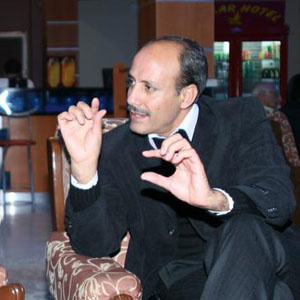Risks of a Non-Pashtun President
Interview with Noazar Shafi’e on Afghanistan and its upcoming presidential elections.

How do you analyze the elections in Afghanistan?
In the early 1990s, a failed state ruled Afghanistan and that led to rise of an extremist group. After the 9/11 attack which resulted in United States occupation of Afghanistan, based on the agreements in the Bonn Conference, a democratic process was developed for and implemented in Afghanistan. Afghanistan’s circumstances today clearly mirror the effect of this process.
Afghanistan has a constitution which contains all the elements of a democratic system. However, in third world countries laws face tough realities when it comes to enforcement. Meanwhile, the political process in Afghanistan is a step forward in terms of democracy despite all the ups and downs.
Who do you think is the winner of the election?
Predicting polls is difficult. The main challenge is between Hamed Karzai and Dr. Abdullah Abdullah. Nevertheless, I believe that Karzai’s reelection is more beneficial for Afghanistan.
Which Karzai’s quality makes him the best choice?
Afghanistan is a traditional society and within the traditional mentality, it is generally considered as a Pashtun country. Many believe that the top figure of the country should be a Pashtun. A non-Pashtun in presidential office may cause defiance among the Afghanistan’s major ethnicity and that will deteriorate Afghanistan’s security conditions.
How will the election and ensuing developments influence Iran?
Well it will definitely have impacts on Iran. Generally, the more stable the periphery, the more guaranteed our national security is. Any election that stabilizes Afghanistan will boost security in Iran’s eastern borders.
What are the effects of the election on Pakistan’s current situation?
Any project carried out to counter Taliban concerns both Pakistan and Afghanistan since the two countries are fighting against Taliban. Stability and a powerful administration in Afghanistan will help further pressing Taliban from north while Pakistan from south and NATO can tighten the cordon around the extremist group and debilitate them.
Narcotics and unrests have destabilized Afghanistan. How will the next Afghan administration treat these two challenges?
On narcotics and stability in the country, the administration is only one of the contributing forces. Regional and international actors should also cooperate to root out the problem. The story of narcotics cultivation in Afghanistan is a global concern and it is not only related to the Afghan society. In fact, the least influential factor is Afghanistan’s administration. It should be financially supported. Also, Afghanistan should be reconstructed and a proper alternative to narcotics should be introduced to the farmers. This is not a problem which could be solved overnight or through elections. It needs true international determination.
In the early 1990s, a failed state ruled Afghanistan and that led to rise of an extremist group. After the 9/11 attack which resulted in United States occupation of Afghanistan, based on the agreements in the Bonn Conference, a democratic process was developed for and implemented in Afghanistan. Afghanistan’s circumstances today clearly mirror the effect of this process.
Afghanistan has a constitution which contains all the elements of a democratic system. However, in third world countries laws face tough realities when it comes to enforcement. Meanwhile, the political process in Afghanistan is a step forward in terms of democracy despite all the ups and downs.
Who do you think is the winner of the election?
Predicting polls is difficult. The main challenge is between Hamed Karzai and Dr. Abdullah Abdullah. Nevertheless, I believe that Karzai’s reelection is more beneficial for Afghanistan.
Which Karzai’s quality makes him the best choice?
Afghanistan is a traditional society and within the traditional mentality, it is generally considered as a Pashtun country. Many believe that the top figure of the country should be a Pashtun. A non-Pashtun in presidential office may cause defiance among the Afghanistan’s major ethnicity and that will deteriorate Afghanistan’s security conditions.
How will the election and ensuing developments influence Iran?
Well it will definitely have impacts on Iran. Generally, the more stable the periphery, the more guaranteed our national security is. Any election that stabilizes Afghanistan will boost security in Iran’s eastern borders.
What are the effects of the election on Pakistan’s current situation?
Any project carried out to counter Taliban concerns both Pakistan and Afghanistan since the two countries are fighting against Taliban. Stability and a powerful administration in Afghanistan will help further pressing Taliban from north while Pakistan from south and NATO can tighten the cordon around the extremist group and debilitate them.
Narcotics and unrests have destabilized Afghanistan. How will the next Afghan administration treat these two challenges?
On narcotics and stability in the country, the administration is only one of the contributing forces. Regional and international actors should also cooperate to root out the problem. The story of narcotics cultivation in Afghanistan is a global concern and it is not only related to the Afghan society. In fact, the least influential factor is Afghanistan’s administration. It should be financially supported. Also, Afghanistan should be reconstructed and a proper alternative to narcotics should be introduced to the farmers. This is not a problem which could be solved overnight or through elections. It needs true international determination.

